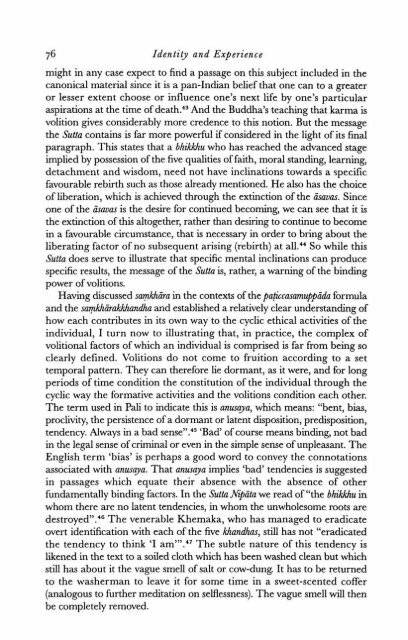Identity and Experience_Hamilton_1996
Identity and Experience_Hamilton_1996
Identity and Experience_Hamilton_1996
Create successful ePaper yourself
Turn your PDF publications into a flip-book with our unique Google optimized e-Paper software.
76 <strong>Identity</strong> <strong>and</strong> <strong>Experience</strong><br />
might in any case expect to find a passage on this subject included in the<br />
canonical material since it is a pan-Indian belief that one can to a greater<br />
or lesser extent choose or influence one's next life by one's particular<br />
aspirations at the time of death.43 And the Buddha's teaching that karma is<br />
volition gives considerably more credence to this notion. But the message<br />
the Sutta contains is far more powerful if considered in the light of its final<br />
paragraph. This states that a bhzkkhu who has reached the advanced stage<br />
implied by possession of the five qualities of faith, moral st<strong>and</strong>ing, learning,<br />
detachment <strong>and</strong> wisdom, need not have inclinations towards a specific<br />
favourable rebirth such as those already mentioned. He also has the choice<br />
of liberation, which is achieved through the extinction of the iisavas. Since<br />
one of the Esavas is the desire for continued becoming, we can see that it is<br />
the extinction of this altogether, rather than desiring to continue to become<br />
in a favourable circumstance, that is necessary in order to bring about the<br />
liberating factor of no subsequent arising (rebirth) at all.44 So while this<br />
Sutta does serve to illustrate that specific mental inclinations can produce<br />
specific results, the message of the Sutta is, rather, a warning of the binding<br />
power of volitions.<br />
Having discussed sapkhira in the contexts of the pa.hcmuppiida formula<br />
<strong>and</strong> the sapk+zErWndha <strong>and</strong> established a relatively clear underst<strong>and</strong>ing of<br />
how each contributes in its own way to the cyclic ethical activities of the<br />
individual, I turn now to illustrating that, in practice, the complex of<br />
volitional factors of which an individual is comprised is far from being so<br />
clearly defined. Volitions do not come to fruition according to a set<br />
temporal pattern. They can therefore lie dormant, as it were, <strong>and</strong> for long<br />
periods of time condition the constitution of the individual through the<br />
cyclic way the formative activities <strong>and</strong> the volitions condition each other.<br />
The term used in Pali to indicate this is anusya, which means: "bent, bias,<br />
proclivity, the persistence of a dormant or latent disposition, predisposition,<br />
tendency. Always in a bad sense".45 'Bad' of course means binding, not bad<br />
in the legal sense of criminal or even in the simple sense of unpleasant. The<br />
English term 'bias' is perhaps a good word to convey the connotations<br />
associated with anuraya. That anusaya implies 'bad' tendencies is suggested<br />
in passages which equate their absence with the absence of other<br />
fundamentally binding factors. In the Sutta N;Pcita we read of "the bhiMu in<br />
whom there are no latent tendencies, in whom the unwholesome roots are<br />
de~troyed".~~ The venerable Khemaka, who has managed to eradicate<br />
overt identification with each of the five kh<strong>and</strong>has, still has not "eradicated<br />
the tendency to think 'I am"'.47 The subtle nature of this tendency is<br />
likened in the text to a soiled cloth which has been washed clean but which<br />
still has about it the vague smell of salt or cow-dung. It has to be returned<br />
to the washerman to leave it for some time in a sweet-scented coffer<br />
(analogous to further meditation on selflessness). The vague smell will then<br />
be completely removed.


